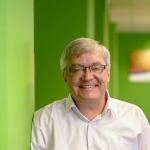The future is to biobased, says DSM’s Anton Robek. In 10-20 years’ time, virtually all of DSM’s feedstock will be biobased. The question now is not if, but how fast industry will get there. It needs to take a hurdle as it scales up. And for Europe to play a part in this game at all, it should give more support to first-of-a-kind factories, allowing industries to learn faster.

Robek, President Bio-based Products & Services at DSM, was one of the panel members at World Bio Markets, last week in Amsterdam. Together with Michele Rubino (Beta Renewables), Michael Duetsch (UPM Biofuels) and Jouko Karvinen (Stora Enso). Sharing knowledge across the entire value chain was one of the main themes of discussion, all the more needed because companies from very diverse backgrounds will have to cooperate in new combinations, that did not exist before. Small, innovative and entrepreneurial companies will drive the development of biobased technologies. Collaboration with larger companies will then provide a platform to replicate success, according to the panellists.
Disruptive innovations and step changes
‘Disruptive innovations might be the game-changers,’ says Robek. ‘Such a disruptive innovation might be the development of cellulosic sugars at a low price and high purity. First, we aim to realise our cost target of $ 0.10 per pound of high-quality sugar. Then we would like to concentrate on the right quality and purity. For ethanol, diesel or butanol production, sugar quality is not of overriding importance because the final product is obtained by distillation. But for most biobased chemical production processes, industry needs clean sugars, to avoid too many impurities in your product broth. We are moving fast in this field and developed pre-treatment technology and appropriate enzymes and yeasts, but these still need to be stabilised.’

‘Another step change might come from the younger generation,’ Robek said in the panel discussion. ‘They can make decisions that shake an entire industry – look at the pace with which the cell phone has developed. ‘Green’ might become a powerful tool to open up new markets. And at DSM, we set up our young businesses in small teams, allowing them direct access to our CEO.’
Smart and fast
‘Unfortunately, Europe does not place biobased at the heart of an industrial strategy,’ says Robek. ‘It aims to develop know-how in labs or pilot plants, whereas in the US and Brazil the goal is to build large-scale facilities. In the US, biobased is driven by its policy for energy independence, in Brazil it is economic growth itself that motivates biobased policy. Moreover, regulation in Europe is extremely cumbersome. The EU does formulate high-level policies, but then leaves it to the member states to apply them. As a result, some companies that have negotiated rules at the European level, then find that they will have to re-negotiate them in 28 capitals.’
‘We will have to do smart things to develop biobased markets and technologies fast. Smart things in crop improvements, smart things with marginal lands. Let us start simple, producing biodiesel and the like. And then move into real biorefineries, with full access to the entire yield. That might be the key to success for the entire biobased sector.’

Start simple, but keep it simple. Energy and sugars at the key. Sugars are only one link in a chain that involves a biocascade of high value product outputs. Flexible sources of sugar inputs, reduction of energy consumption, acceptance of no green premium by producers and work back from the consumer to the cist of production… Not the other way around.